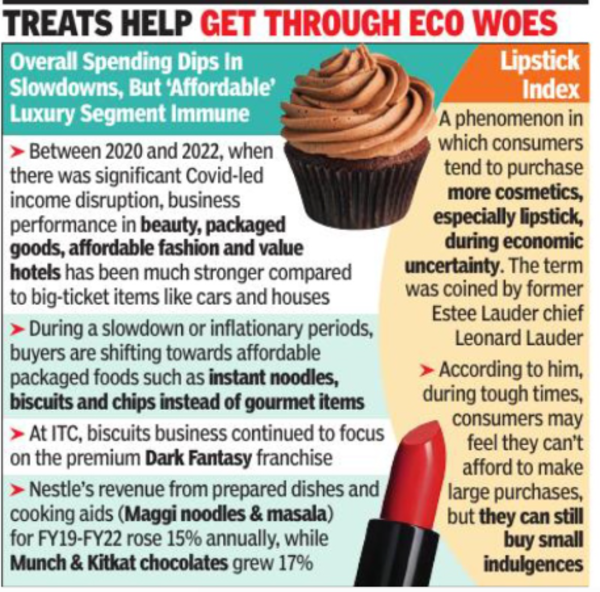- News
- Business News
- India Business News
- Small indulgences beat inflation blues
Trending
Small indulgences beat inflation blues

Money seemingly can buy happiness when inflation bites. As spending power drops due to a surge in prices, value-conscious buyers forgo big-ticket purchases and instead opt for ‘affordable’ indulgences to lift their spirits.
The consumer behaviour phenomenon — popularised in the 2001 recession with the ‘lipstick index’ by Leonard Lauder, the chairman of cosmetics giant Estee Lauder — seems to hold true for consumers and companies in India too, an I-Sec study shows. Consumer-focused companies TOI spoke to said sales of some discretionary products mirror this trend.
Over the past 10 years, the Nifty index delivered below inflation returns ( under 6%) in 2016, 2019 and 2020. But companies in the mid-premium and discretionary goods’ space — including Hindustan Unilever, Nestle, Britannia, VMart and Trent — saw a lower impact (as reflected in their revenue growth and stock price) of the slowdown in most of those years.
Even between financial years 2020 and 2022, when there was significant Covid-led income disruption, business performance in beauty, packaged goods, affordable fashion and value hotels has been much stronger compared to big-ticket items (like cars and houses). Hence, ‘affordable luxury’ segments are relatively immune to general economic slowdown, the study said.

For instance, during a slowdown, consumers shift towards affordable packaged foods such as instant noodles, biscuits and chips, instead of expensive gourmet items. Nestle’s revenue from prepared dishes and cooking aids (Maggi noodles and Masalaae-Magic) for FY19-FY22 showed robust growth — a compound annual growth rate (CAGR) of nearly 15% — while confectionery (Munch and Kitkat chocolates) clocked just over 17%. Further, for biscuit-manufacturer Britannia, the CAGR stood at 14%.
Moreover, the ‘lipstick index’ trend seems to be percolating to the affordable fashion and travel sector aswell. Consumers may turn to purchasing affordable fashion like private labels, scarves, handbags and jewellery (small-ticket) instead of buying more expensive items.
The behaviour shift during Covid was a testament to the desire for small indulgences and the significance of finding joy in little things, Aditya Birla Fashion and Retail business head (Jaypore) Rashmi Shukla said.
“We recognise that consumer behaviour can evolve during economic downturns. We noticed a shift when consumers moved away from high-end embroidered Kashmiri shawls priced over Rs 75,000 to solid Kashmiri pashminas priced Rs 16,000-20,000. In our homeware section, we saw double-digit growth in the mid-premium section. People moved away from fine porcelain to handcrafted Kansa dinner and serveware. This was also triggered by the consumer’s shift towards healthier living and their yearning for something authentic and rooted,” she added.
At ITC, the premiumisation trend was evident across categories like staples with the value-added portfolio of ‘Aashirvaad’ witnessing strong consumer traction. The biscuits business continued to focus on the premium segment, the Dark Fantasy franchise, to enhance brand affinity and increase penetration in emerging channels.
“Discerning consumers at the upper end of the curveare seeking unique and innovative products that provide better sensorial experiences and contain natural ingredients as well as offerings in the health and wellness space, including millet-based products,” ITC’s executive director B Sumant said. There is also a preference for affordable travel destinations, the study added. A case in point is that the occupancy rate for IHCL (which operates Taj hotels) stands at 73% versus 68% during prepandemic levels (in FY19).
A Nestle executive said, “Consumer preferences are fast evolving. In the post-pandemic world, consumers are looking for brands that offer high-quality ingredients — credible, transparent, trustworthy, and scientifically better modulated brands are going to be the call. We are seeing a positive traction in terms of the desire of consumers to look for brands that have been around for a while and offer these qualities. This is fuelling the consumption momentum. While the overhang of decadal high inflation and other global headwinds continue, we believe there is a quiet positivity that is working through the consumption economy. ”
Shivendra Nigam, CFO of Cantabil Retail, an apparel manufacturer in the mid-premium segment, gets mainly “entrance-level customers” as it is “reasonably priced”. The company witnessed a CAGR of 24% over 2019-2023.
The consumer behaviour phenomenon — popularised in the 2001 recession with the ‘lipstick index’ by Leonard Lauder, the chairman of cosmetics giant Estee Lauder — seems to hold true for consumers and companies in India too, an I-Sec study shows. Consumer-focused companies TOI spoke to said sales of some discretionary products mirror this trend.
Over the past 10 years, the Nifty index delivered below inflation returns ( under 6%) in 2016, 2019 and 2020. But companies in the mid-premium and discretionary goods’ space — including Hindustan Unilever, Nestle, Britannia, VMart and Trent — saw a lower impact (as reflected in their revenue growth and stock price) of the slowdown in most of those years.
Even between financial years 2020 and 2022, when there was significant Covid-led income disruption, business performance in beauty, packaged goods, affordable fashion and value hotels has been much stronger compared to big-ticket items (like cars and houses). Hence, ‘affordable luxury’ segments are relatively immune to general economic slowdown, the study said.

For instance, during a slowdown, consumers shift towards affordable packaged foods such as instant noodles, biscuits and chips, instead of expensive gourmet items. Nestle’s revenue from prepared dishes and cooking aids (Maggi noodles and Masalaae-Magic) for FY19-FY22 showed robust growth — a compound annual growth rate (CAGR) of nearly 15% — while confectionery (Munch and Kitkat chocolates) clocked just over 17%. Further, for biscuit-manufacturer Britannia, the CAGR stood at 14%.
Moreover, the ‘lipstick index’ trend seems to be percolating to the affordable fashion and travel sector aswell. Consumers may turn to purchasing affordable fashion like private labels, scarves, handbags and jewellery (small-ticket) instead of buying more expensive items.
The behaviour shift during Covid was a testament to the desire for small indulgences and the significance of finding joy in little things, Aditya Birla Fashion and Retail business head (Jaypore) Rashmi Shukla said.
“We recognise that consumer behaviour can evolve during economic downturns. We noticed a shift when consumers moved away from high-end embroidered Kashmiri shawls priced over Rs 75,000 to solid Kashmiri pashminas priced Rs 16,000-20,000. In our homeware section, we saw double-digit growth in the mid-premium section. People moved away from fine porcelain to handcrafted Kansa dinner and serveware. This was also triggered by the consumer’s shift towards healthier living and their yearning for something authentic and rooted,” she added.
At ITC, the premiumisation trend was evident across categories like staples with the value-added portfolio of ‘Aashirvaad’ witnessing strong consumer traction. The biscuits business continued to focus on the premium segment, the Dark Fantasy franchise, to enhance brand affinity and increase penetration in emerging channels.
“Discerning consumers at the upper end of the curveare seeking unique and innovative products that provide better sensorial experiences and contain natural ingredients as well as offerings in the health and wellness space, including millet-based products,” ITC’s executive director B Sumant said. There is also a preference for affordable travel destinations, the study added. A case in point is that the occupancy rate for IHCL (which operates Taj hotels) stands at 73% versus 68% during prepandemic levels (in FY19).
A Nestle executive said, “Consumer preferences are fast evolving. In the post-pandemic world, consumers are looking for brands that offer high-quality ingredients — credible, transparent, trustworthy, and scientifically better modulated brands are going to be the call. We are seeing a positive traction in terms of the desire of consumers to look for brands that have been around for a while and offer these qualities. This is fuelling the consumption momentum. While the overhang of decadal high inflation and other global headwinds continue, we believe there is a quiet positivity that is working through the consumption economy. ”
Shivendra Nigam, CFO of Cantabil Retail, an apparel manufacturer in the mid-premium segment, gets mainly “entrance-level customers” as it is “reasonably priced”. The company witnessed a CAGR of 24% over 2019-2023.
Start a Conversation
FOLLOW US ON SOCIAL MEDIA
FacebookTwitterInstagramKOO APPYOUTUBE















